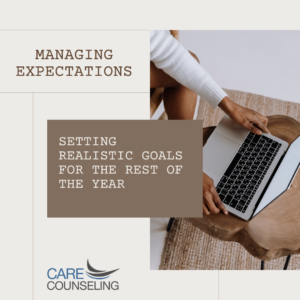Setting Realistic Goals for the Rest of the Year
 As the year progresses and we approach the final months, it’s natural to reflect on the goals we set for ourselves at the beginning of the year. While setting ambitious goals can be motivating, it’s equally important to manage our expectations and ensure that our goals remain attainable and aligned with our current circumstances. By taking a mindful approach to goal setting and focusing on setting realistic goals for the rest of the year, we can enhance our chances of success and experience a sense of fulfillment as we strive to achieve what matters most to us.
As the year progresses and we approach the final months, it’s natural to reflect on the goals we set for ourselves at the beginning of the year. While setting ambitious goals can be motivating, it’s equally important to manage our expectations and ensure that our goals remain attainable and aligned with our current circumstances. By taking a mindful approach to goal setting and focusing on setting realistic goals for the rest of the year, we can enhance our chances of success and experience a sense of fulfillment as we strive to achieve what matters most to us.
The Pitfalls of Unrealistic Expectations
Setting unrealistic goals can lead to stress, frustration, and disappointment. When our expectations exceed what is realistically achievable within a given timeframe, we may find ourselves overwhelmed, demotivated, or even tempted to abandon our goals altogether. Unrealistic expectations can also hinder our ability to appreciate the progress we’ve made, as we become fixated on the gap between where we are and where we wish to be.
Embracing Realism in Goal Setting
Embracing realism in goal setting involves aligning our aspirations with our current reality, capacities, and commitments. Here’s how you can set realistic goals for the remainder of the year while managing your expectations:
- Reflect on Your Journey So Far
Take a moment to reflect on the progress you’ve made since the beginning of the year. Celebrate your accomplishments, no matter how small they may seem. Acknowledging your achievements can boost your confidence and provide a positive foundation for setting future goals.
- Assess Your Current Situation
Consider your current circumstances, including your personal and professional responsibilities, commitments, and available resources. Taking an honest inventory of your situation will help you gauge what is realistically attainable within the time frame you have left.
- Prioritize Your Goals
It’s important to prioritize your goals based on their significance and feasibility. Instead of spreading yourself thin across numerous goals, focus on a select few that truly resonate with your values and align with your current priorities.
- Break Down Larger Goals
If you have larger, long-term goals that you set at the beginning of the year, break them down into smaller, actionable steps. This approach not only makes your goals more achievable but also provides a sense of accomplishment as you make progress.
- Set SMART Goals
Apply the SMART criteria to your goal setting: Specific, Measurable, Achievable, Relevant, and Time-bound. Each goal should be clear, measurable, and have a realistic timeframe for completion.
- Consider External Factors
Recognize that there are external factors beyond your control that can influence your progress. Be prepared to adapt your goals and plans as needed to accommodate unforeseen circumstances.
- Embrace Flexibility
Flexibility is key to managing expectations. Life is dynamic, and circumstances can change. Allow yourself to adjust your goals as needed, without feeling discouraged.
- Focus on the Journey
While achieving your goals is important, remember that the journey itself holds value. The growth, learning, and experiences you gain along the way contribute to your personal development.
- Practice Self-Compassion
Be kind to yourself throughout the goal-setting process. If you encounter setbacks or don’t achieve everything you set out to do, remember that you’re human. Practice self-compassion and acknowledge that progress is a journey.
- Celebrate Small Wins
Celebrate your accomplishments, no matter how minor they may seem. Every step forward, no matter how small, brings you closer to your larger goals.
Embrace a Mindful Approach
By managing your expectations and setting achievable goals, you’re creating a framework for success that supports your growth and well-being. Remember that life is a journey, and every step you take towards your goals is a step towards a more fulfilling and purposeful life.



























